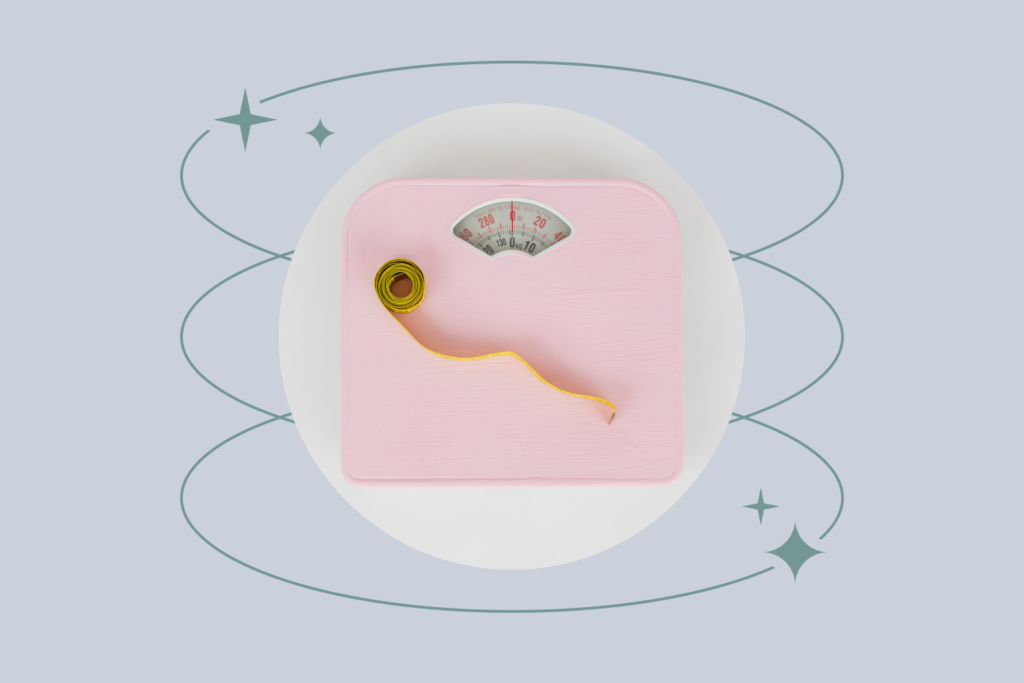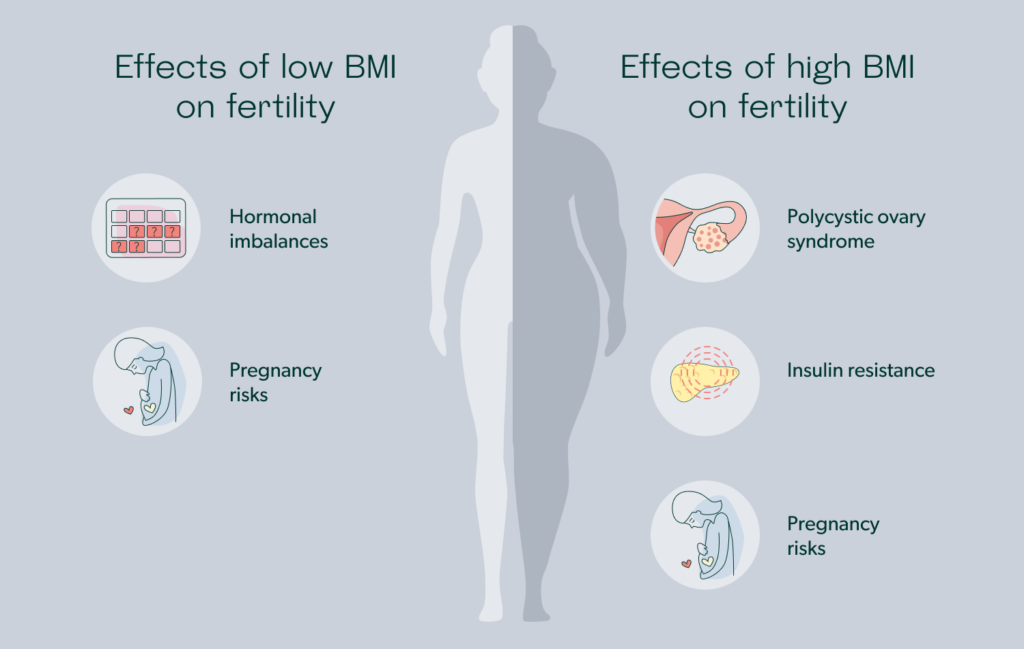BMI and Fertility: What You Need to Know While TTC
You’re probably already familiar with the medical tool known as the Body Mass Index (BMI) – but how much do you know about the relationship between BMI and conception?

In this article, we’ll cover everything you need to know about BMI within the context of getting pregnant – including how doctors use BMI, how low and high BMIs can impact your fertility, and what the research says about a “healthy” BMI range.
Ready? Let’s go!
What is BMI?
BMI or “Body Mass Index” is a general screening tool used by doctors to estimate body fat. To calculate BMI, an individual’s weight in kilograms is divided by their height in meters squared.
According to the Center for Disease Control, adults with a BMI of 18.5 to 24.9 are considered at a healthy weight. Other weight categories include underweight (BMI less than 18.5), overweight (BMI between 25.0 and 29.9), and obese (BMI of 30.0 and above).
| BMI | Weight Status |
| Below 18.5 | Underweight |
| 18.5 – 24.9 | Healthy weight |
| 25.0 – 29.9 | Overweight |
| 30.0 and above | Obesity |
Source: Center for Disease Control: About Adult BMI
BMI as a screening tool
BMI is primarily used as a screening tool for certain weight-related risk factors. For example, these risks could be high blood pressure, high cholesterol, and type 2 diabetes in overweight individuals, and malnutrition, immune deficiencies, and anemia in underweight individuals. In ovulating individuals, BMI may also be taken into consideration when assessing fertility.
Limitations of BMI
It’s important to note that BMI does have several limitations, as noted by the CDC. For example, BMI does not take an individual’s age, sex, or ethnicity into account. It also does not account for body shape, fat distribution, muscle mass percentages, or bone mass percentages. This is why doctors only use BMI as a general screening tool and not a diagnostic tool.
Calculating your BMI
There are a number of online calculators that can help you estimate your BMI. We recommend this Adult BMI calculator from the CDC – it’s simple and free to use!
If your BMI is higher/lower than you anticipated, it’s a good idea to speak with your healthcare provider. They can assess your individual situation and determine if your BMI is a health risk within the context of your lifestyle, family history, and fertility goals.
The Impact of BMI on Fertility
All aspects of our health can influence our fertility, and this includes our weight and relative body fat. Individuals who are either above or below a healthy BMI range may struggle to conceive and/or maintain a healthy pregnancy. They may also experience complications during delivery.
Effects of low BMI on fertility
Hormonal imbalances
It is common for individuals with a low BMI to experience hormone imbalance, which directly impacts fertility. For example, being underweight is associated with low leptin and estrogen levels, which may interfere with the body’s ability to ovulate. This can cause an individual’s periods to become irregular or even stop altogether. This can make it difficult and even impossible to get pregnant.
For information on how to balance your hormones naturally at home, check out our article 13 Ways to Balance Hormones Naturally (Lifestyle Guide).
Pregnancy risks
Individuals with a low BMI are also at an increased risk for certain pregnancy complications. This includes miscarriage, preterm birth, and low birth rate.

Effects of high BMI on fertility
Polycystic ovary syndrome (PCOS)
Research suggests that there is a close link between polycystic ovary syndrome (PCOS) and a high BMI. PCOS is a condition that affects ovarian functioning. The most common symptoms include high testosterone, chronic lack of ovulation (anovulation), and the presence of small cysts on the ovaries – all of which can hinder your ability to get pregnant.
While there is no cure for PCOS, it is much easier to manage the symptoms when at a healthy weight.
For information on how Mira can help you get pregnant with PCOS, check out our dedicated PCOS guide on our website.
Insulin resistance
Individuals with a high BMI are also at risk of developing insulin resistance, which is a condition where the body can no longer regulate its blood sugar. This not only makes the body more susceptible to weight gain, but it can also cause PCOS symptoms to worsen. In turn, this can make it more difficult to get pregnant.
Pregnancy risks
Individuals with a high BMI are also at an increased risk for certain pregnancy complications. This includes miscarriage, high blood pressure, preeclampsia, gestational diabetes, cesarean birth, and stillbirth.
What the Research Says
BMI and female fertility
Numerous studies have examined the relationship between BMI and female fertility. Here are just a few key findings to note:
- Both low and high BMIs are associated with an increased risk of infertility.
- The time it takes to get pregnant is higher for overweight, obese, and very obese individuals compared to healthy-weight individuals.
- High BMI (obese) individuals have lower fertilization rates and higher miscarriage rates when undergoing IVF.
- Low BMI (underweight) individuals are at a greater risk of experiencing negative pregnancy outcomes when undergoing IVF.
Whether you’re trying to conceive (TTC) in your 20s, 30s, or 40s, maintaining a healthy BMI can help to improve your chances of conception while also reducing your risk of experiencing a pregnancy complication. In practice, this means aiming to keep it within the “healthy” range of 18.5 to 24.9 (or whatever range is recommended by your doctor).
BMI and male fertility
In addition to female fertility, BMI also plays a huge role in male fertility, too. In fact, recent research has found the following:
- Both low and high BMIs are associated with poor semen quality in men.
- Low BMI is considered a harmful factor for male infertility.
- Sperm quality decreases as BMI and waist circumference increases.
Similar to women, men can also do their part to maximize the chances of conception by maintaining a BMI within the healthy range of 18.5 to 24.9.
3 Tips for Maintaining a Healthy BMI
Eat a balanced diet
A balanced diet is essential for maintaining a healthy BMI. This can include a range of foods with varying nutrient levels – including fruits, vegetables, lean meats, dairy, nuts and seeds, and whole grains.
If this feels overwhelming to you, check out the Harvard School of Public Health’s guide on healthy eating. You may also find the following articles from Mira helpful: Pre-Pregnancy Diet: What Foods Should You Be Eating When TTC? and Food and TTC: 12 Fertility Recipes + What to Avoid.
Stay active
Staying active throughout the day is another great way to help regulate your weight and hormones. Not only that, but it can also help to reduce stress, improve sleep, improve strength, and boost your energy levels!
There is no right or wrong way to exercise – the only thing that matters is that you find something that you enjoy doing consistently. Here are a few activity ideas for inspiration: walking, jogging, dancing, swimming, hiking, cycling, yoga, pilates, weight lifting, circuit training, and more!
Seek out support
Maintaining a healthy weight can be a challenge. No matter what you are going through, there is no shame in seeking out extra support if you need it. Whether that be from a dietician, personal trainer, medical professional, or even a fertility coach for getting lifestyle tips, there are people out there waiting to help you – all you have to do is ask.

A little extra support from an expert can go a long way
Book an online consultation with one of our Hormone Health Coaches.
Schedule NowIt may also be worth checking out the numerous support groups available online or perhaps within your local community. This is a great way to find inspiration and togetherness from other individuals who are going through exactly what you are going through.
Frequently Asked Questions (FAQs)
How does BMI affect ovulation?
A BMI that is too high or too low can lead to hormone imbalance, particularly with the hormones estrogen, progesterone, leptin, and testosterone. In turn, this can interfere with the body’s ability to ovulate, making it difficult to get pregnant.
Can losing weight improve fertility?
Yes. Losing weight can help to regulate fertility hormones and ease symptoms of polycystic ovarian syndrome (PCOS).
Is it possible to get pregnant with a high BMI?
Yes. It is still possible to get pregnant with a high BMI. However, high BMI pregnancies are at a greater risk of certain pregnancy complications such as miscarriage, high blood pressure, preeclampsia, gestational diabetes, cesarean birth, and stillbirth.
If you have a high BMI and are actively seeking to get pregnant, it’s a good idea to speak with your doctor about strategies for losing weight. This will not only improve your chances of becoming pregnant, but it will also help to reduce your risk of complications during pregnancy.
What BMI range is considered optimal for fertility?
A BMI of 18.5 to 24.9 is considered healthy and optimal for fertility. However, this may vary based on your individual lifestyle and medical history. Speak with your doctor if you are concerned about your BMI and its impact on your TTC journey.
How long does it take for BMI changes to impact fertility?
Like any other major lifestyle change, it can take some time until you start to notice a difference. Whether it’s your period coming back or becoming more regular, It may take at least six months to a year before you start to see a difference.
Does BMI affect male fertility as well?
Yes. Research suggests that having a low or high BMI can have a negative effect on sperm quality, making it more difficult to conceive.
What other factors besides BMI can impact fertility?
In addition to BMI, there are several other lifestyle factors that can impact your ability to get pregnant. This includes diet, sleeping habits, stress levels, substance use (and abuse), and certain medications.

Mira’s Editorial Process
All content produced by Mira meets stringent editorial standards, ensuring excellence and accuracy in language and medical precision. Every piece undergoes thorough fact-checking and review by qualified professionals. Check out our full editorial process to learn more.










